Call Us :
407/2A2 UVS NAGAR, MATHAMPALAYAM - 641 019, COIMBATORE, TAMILNADU, INDIA
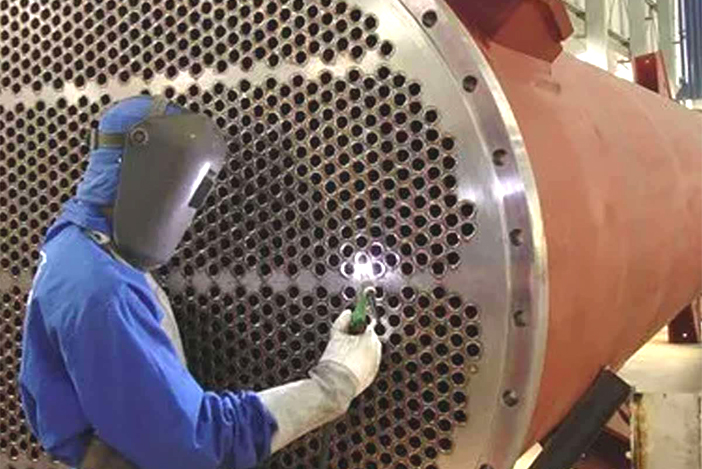
Tube Inspections Services have been carried out by IRIS NDT Technologies personnel for the Petrochemical and Power Generation. We specialize in Eddy Current and Ultrasonic techniques for both ferrous and non-ferrous tubing. Our line of techniques includes:
Scheduled shutdowns present an opportunity for planned inspection programs which enable continued operation of critical plant equipment by minimizing unexpected failures. Prior to deciding which techniques are most suitable for your needs the following items should be considered: number of tubes to be inspected; cleanliness of tubes and time available for inspection.
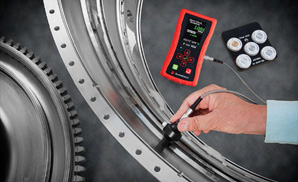
This is the most common technique utilized for the inspection of non-ferrous tubing, the technology is very reliable and can determine tube condition in relation to general wall reduction and the presence of local defects such as pitting and cracking with a high probability of detection when using the correct probes. Standard inspection technique for smooth tubing utilizes two separate channels for data acquisition; Absolute (wall reduction) and Differential (local defects).
When inspecting finned tubing (chillers) an A/C probe is used to reduce noise associated with fins. Detailed analysis can be performed using software tools which can determine location of defects in relation to ID/OD of tube wall by Phase Analysis from depth curves which are generated from calibration standard. Software tools also allowing for mixing of baffle signature to evaluate flaws hidden behind baffle supports
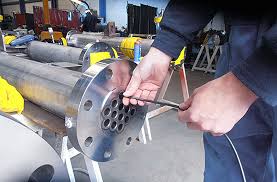
This is a fast reliable screening tool for the condition assessment of ferrous tubing (carbon steel, ferritic stainless steel and Duplex). Works typically at very low frequencies (100 Hz to 1 kHz) and very high signal gains (> 80 dB) can inspect up to 12 mm (1/2 in.) of carbon steel pipe.
Typically two channels are used for examination, Absolute for wall thinning and Differential for localized defects RFT is very good at wall thinning measurement but less performing to pitting (as compared to ECT). To improve inspection results it is always advised to perform cleaning of the internal bore of tubes with some form of water jet lancing tool
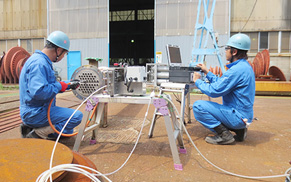
This is an ultrasonic technique for condition assessment of tubing of all materials with a tube wall thickness greater than 1mm. The technology can precisely measure remaining wall thickness from corrosion, erosion, pitting and wear associated with baffle supports. However it requires a very high standard of cleaning and is a much slower technique than the ECT or RFT test methods.
It is not possible to detect cracking with IRIS. The system uses a rotating turbine head with a transducer sending a single into tube wall via an angular mirror. The image displayed can be seen as a B-Scan (Cross-sectional view) and also in a C-Scan (Development of Longitudinal axis of tube).
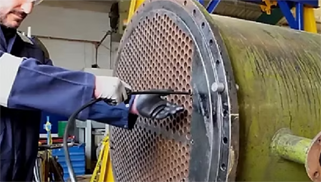
The principle of operation is based on magnetization, two permanent magnets coupled to a steel core are used to magnetize the tube wall until complete saturation is reach. To that, three coils are added each one being sensitive to specific defects. An absolute coil is winded around the core to measure the magnetic field variation caused by general wall losses. This makes MFL more a detection method than a sizing one. Inspection is quite fast the pulling speed can go up to 1 m/s.

Near field testing (NFT) technology is a rapid and inexpensive solution intended specifically for fin-fan carbon-steel tubing inspection. This new technology relies on a simple driver-pickup eddy current probe design providing very simple signal analysis.NFT is specifically suited to the detection of internal corrosion, erosion, or pitting on the inside of carbon steel tubing. The NFT probes measure lift-off or "fill factor," and convert it to amplitude-based signals (no phase analysis). Because the eddy current penetration is limited to the inner surface of the tube, NFT probes are not affected by the fin geometry on the outside of the tubes.